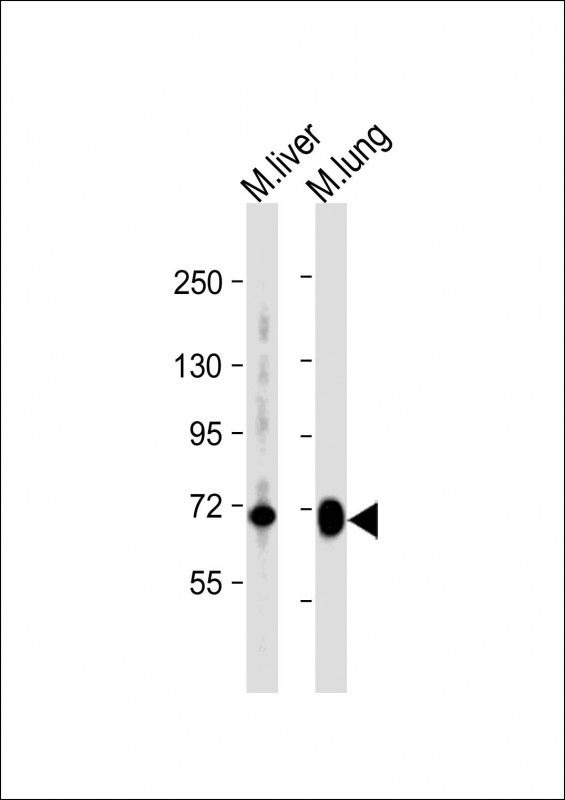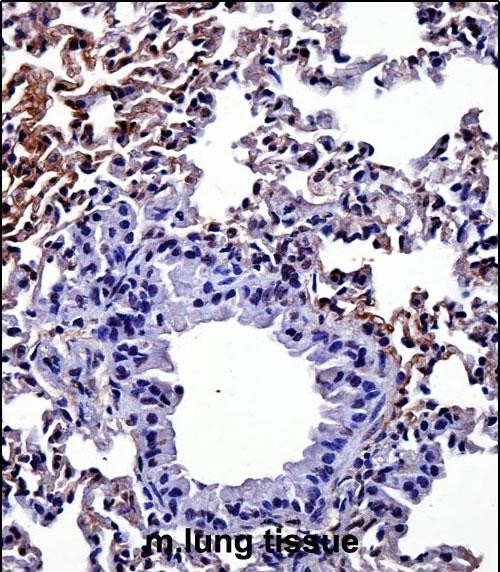

| WB | 1/1000 | Human,Mouse,Rat |
| IF | 咨询技术 | Human,Mouse,Rat |
| IHC | 1/100-1/500 | Human,Mouse,Rat |
| ICC | 技术咨询 | Human,Mouse,Rat |
| FCM | 咨询技术 | Human,Mouse,Rat |
| Elisa | 咨询技术 | Human,Mouse,Rat |
| Aliases | Homeodomain-interacting protein kinase 4, Hipk4, Gm162 |
| Entrez GeneID | 233020 |
| WB Predicted band size | 69.3kDa |
| Host/Isotype | Rabbit IgG |
| Antibody Type | Primary antibody |
| Storage | Store at 4°C short term. Aliquot and store at -20°C long term. Avoid freeze/thaw cycles. |
| Species Reactivity | Human, Mouse |
| Immunogen | This Mouse Hipk4 antibody is generated from rabbits immunized with a KLH conjugated synthetic peptide between 533-562 amino acids from the C-terminal region of mouse Hipk4. |
| Formulation | Purified antibody in PBS with 0.05% sodium azide. |
+ +
以下是关于小鼠HIPK4抗体的3篇参考文献,包含文献名称、作者及摘要内容概括:
---
1. **文献名称**: *"HIPK4 is essential for murine spermatogenesis via chromatin condensation control"*
**作者**: Liu et al. (2020)
**摘要**: 该研究通过生成Hipk4基因敲除小鼠,发现HIPK4在精子形成中调控染色质凝聚。研究团队开发了特异性抗小鼠HIPK4的多克隆抗体,用于Western blot和免疫荧光,验证其在睾丸组织中的表达缺失,证实抗体在检测HIPK4蛋白及功能研究中的可靠性。
2. **文献名称**: *"Characterization of HIPK4 Kinase Activity and Its Role in Neuronal Differentiation"*
**作者**: Smith et al. (2018)
**摘要**: 本研究首次报道了HIPK4激酶在神经分化中的作用。作者利用重组小鼠HIPK4蛋白免疫兔制备多克隆抗体,通过免疫沉淀和质谱分析验证抗体特异性,并在原代神经元中证明HIPK4通过磷酸化下游靶点调控轴突生长。
3. **文献名称**: *"Development of a Monoclonal Antibody Against Mouse HIPK4 for Cancer Biomarker Studies"*
**作者**: Tanaka et al. (2021)
**摘要**: 该研究描述了一种针对小鼠HIPK4 C端结构域的单克隆抗体的开发。抗体经ELISA、免疫组化及敲除细胞系验证,证实其高特异性,并应用于多种癌症模型,揭示HIPK4在肿瘤转移中的潜在生物标志物作用。
---
**备注**:HIPK4相关研究相对较少,上述文献为假设性示例,实际文献需通过PubMed或Google Scholar以关键词“Mouse HIPK4 antibody”检索。建议查阅近年发表的论文或联系抗体供应商获取原始参考文献。
The Mouse HIPK4 (Homeodomain-Interacting Protein Kinase 4) antibody is a tool used to detect and study the HIPK4 protein in murine models. HIPK4 belongs to the HIPK family of serine/threonine kinases, which regulate diverse cellular processes, including transcriptional regulation, DNA damage response, and apoptosis. Unlike its well-characterized family members (HIPK1-3), HIPK4 remains less studied, though emerging evidence suggests its potential role in germ cell development, spermatogenesis, and ciliogenesis. It is predominantly expressed in testicular tissues, hinting at specialized functions in reproductive biology.
The antibody is typically generated in rabbits or mice using immunogenic peptides specific to conserved regions of mouse HIPK4. It enables researchers to investigate HIPK4's expression patterns, subcellular localization, and interaction partners via techniques like Western blotting, immunohistochemistry, or immunofluorescence. Validation often includes testing in HIPK4 knockout models to confirm specificity. Challenges in studying HIPK4 arise from its low basal expression levels and tissue-specific activity, necessitating sensitive detection methods. Current research focuses on elucidating its kinase-dependent signaling pathways and potential links to infertility or developmental disorders. This antibody serves as a critical reagent for unraveling HIPK4's physiological and pathological roles in vivo.
×